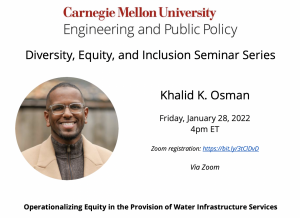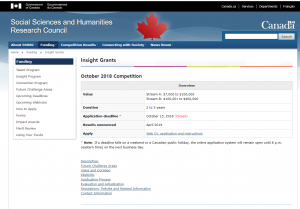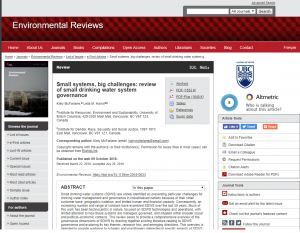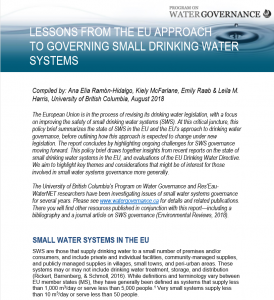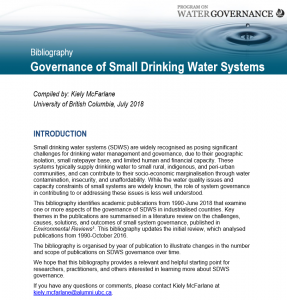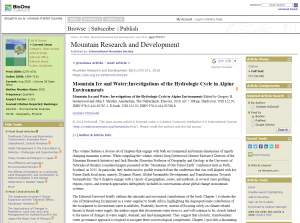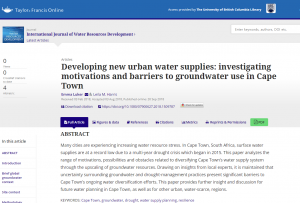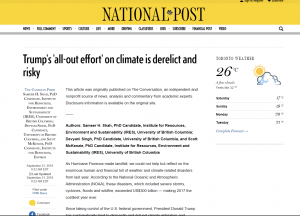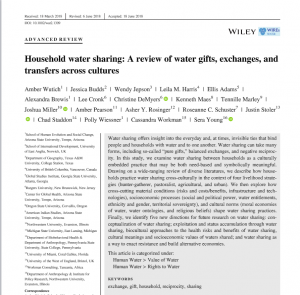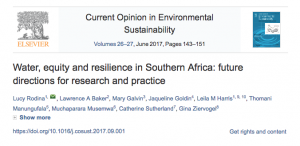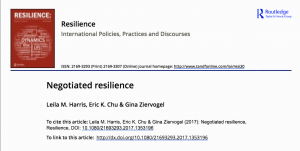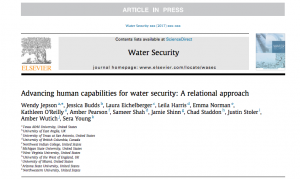NEW PUB FROM EDGES MEMBER LEILA HARRIS:
Jankovic-Rankovic, J., Roque, A., Rosinger, A., Adams, E., Pearson, A.L., Lloréns, H., Garcia-Quijano, C., Stoler, J., Harris, L.M., Wutich, A., Brewis, A. (2024). Household water sharing: implications for disaster recovery and water policy. Water Security, 23. https://doi.org/10.1016/j.wasec.2024.100178
UPCOMING SEMINAR, JAN 28: OPERATIONALIZING EQUITY IN THE PROVISION OF WATER INFRASTRUCTURE SERVICES
On January 28, at 4:00 pm, Khalid K. Osman will be speaking via zoom as part of the Diversity, Equity, and Inclusion Seminar Series hosted by Carnegie Melon’s Engineering and Public Policy department. Abstract: Historic decisions in the water sector were designed to limit access to certain groups of people with impacts that still loom […]
Chapter 19
Participation’s limits: Tracing the Contours of Participatory Water Governance in Accra, Ghana, Cynthia Morinville and Leila Harris In the context of increasing focus on participatory resource governance, this chapter focuses on the case of Local Water Boards in underserved areas of Accra, Ghana. Our analysis suggests that the boards are serving several important functions, for instance […]
Chapter 18
Problems and Prospects for Genuine Participation in Water Governance in Turkey, Zeynep Kadirbeyoglu and Ekin Kurtic This chapter focuses on hydroelectric power plants (HPPs) and the decentralization of irrigation in Turkey to explore whether there is participation of local communities in the processes of decision-making and implementation. We find that the question of participation lies at […]
Chapter 17
Who is a Water User? The Politics of Gender in Egypt’s Water User Associations, Jessica Barnes Participation in institutions of participatory water management, including in water user associations (WUAs), is frequently patchy. Drawing on an ethnographic study of a project to establish WUAs in one of Egypt’s provinces, this chapter traces the roots of limited female […]
Chapter 16
The Participatory Paradigm: anathema, praise and confusion, Jacqueline Goldin Sites across the developing world bear the marks of failed projects touted as ‘participatory’ that have not fully, or meaningfully, involved stakeholders at multiple scales. This chapter isolates ‘four fatal flaws’ to interrogate the concept of participation: (1) participation is enmeshed with notions of decentralization and devolution, […]
Chapter 13
Privatization of water services in Kenya: supply strategies for the urban poor, O A K’Akumu This chapter assesses Kenya’s water privatization program, with particular focus on the efforts made to ensure that the needs of those living in informal settlements and of others with inadequate water provision are served. Privatization was pursued following years of poor […]
Chapter 12
(Dis)connecting the flow, steering the waters: Building hegemonies and ‘private water’ in Zambia, 1930s to the present, Hillary Waters This chapter examines four moments in Zambian history to argue hegemony is a dual process: bundling ideologies, institutions and context engenders power while representing water as isolated from this process provides hegemony the guise of objectivity. Investigating […]
Chapter 11
Variable Histories and Geographies of Marketization and Privatization, Leila M Harris Water privatization and marketization are unfolding in distinct ways in various places and regions. This paper traces the contours of the variable histories and geographies of privatization and marketization, including the history of private water provision in North America and Europe, and the contemporary push […]
Chapter 10
Framing the Debate on Water Marketization and Privatization, Leila M. Harris How and why have water marketization and privatization emerged as hegemonic? This chapter reviews the state of knowledge in this regard, suggesting that the ‘bundling’ of these concepts as necessarily linked has been crucial to their rapid uptake. Linking to other themes of the book, […]
Chapter 7
Abundance and Scarcity Amidst the Crisis of “Modern Water”: Changing Water-Energy Nexus in Turkey, Sinan Erensu The world of hydropower is in transition: as large dams have lost their credibility, run-of-the-river small hydropower plants (SHPs) are gaining currency thanks to their perceived eco-friendliness in post-carbon economy. Focusing on Turkey’s green energy drive, this chapter looks at […]
Chapter 6
Water Scarcity and the Colonial State: the emergence of a Hydraulic Bureaucracy in Southwestern Matabeleland, Southern Rhodesia, 1964 -1972 , Muchaparara Musemwa This chapter examines how water was institutionalized in southwestern Matabeleland, 1964-1972, Rhodesia, following a devastating drought in 1964-65 and how ‘water scarcity’ became a dominant idea in this specific locale. This drought triggered a ‘crisis’ condition […]
Chapter 5
Tensions in Narratives and Lived Realities of Water Crisis in Damascus, Basil Mahayni This chapter analyzes narratives of water crisis in Damascus, and considers these against Syria’s modernization projects of the last forty years. Rather than isolating water crises as specific to Damascus, the chapter argues that a broader set of conditions unfolding across time throughout Syria […]
Chapter 4
Producing Crisis: Hegemonic Debates and Mediations and Representations of Water Scarcity, Basil Mahayni This chapter interrogates the common-sense notion of increasing freshwater scarcity. While water quantity, quality, and hydrological systems become increasingly uncertain in some contexts, there is nonetheless a range of tensions that emerge through an investigation of hegemonic representations of water scarcity. Providing a […]
Chapter 3
Response from Biophysical and Engineering Perspectives, Lawrence Baker The core themes of this book – scarcity, marketization, and participation – in the context of water governance – cannot be fully understood without the perspectives of science and technology. On one hand, technocratic hegemonies have often had unfortunate consequences. On the other, emerging information technologies offer the […]
Chapter 2
Water, Governance, and Hegemony, Chris Sneddon This chapter examines the rise of a variety of concepts—scarcity, marketization and participation— that have assumed hegemonic status within discourses and practices associated with water governance. The chapter’s aim is to provide a common frame of reference for how subsequent chapters treat the notion of hegemonic concept in the water […]
Chapter 1
Introduction, Jacqui Goldin, Chris Sneddon, Leila Harris This chapter introduces key themes of interest, as well as contributions from the chapters and sections of the book.
